BENTIU, South Sudan — Megan Nobert doesn’t remember the most crucial part of that February night, because someone made sure she wouldn’t.
She remembers the outdoor dinner and drinks with colleagues, humanitarians like herself working to bring food and water and school and safety to thousands of South Sudanese people who’d fled the violence that has followed a leadership fight between South Sudanese President Salva Kiir and his former vice president, Riek Machar. Their dispute has roots in the country’s decades-long liberation struggle, and their men — Kiir has the national army, Machar has a formidable rebel force — have been battling since December 2013. Across Unity State, the rebel stronghold where Nobert was working, and elsewhere in the country, hospitals and schools have been destroyed, cattle raided, food looted, and villages emptied. Thousands have been killed in massacres; thousands more have fled, the luckiest of them ending up in places like this, encircled by United Nations peacekeepers at the “protection of civilians” camp where Nobert and her colleagues worked.
Nobert remembers joining colleagues that night at the U.N. base’s small bar and buying a glass of red wine. She remembers dancing with one of the U.N. police staffers, and making plans to meet another colleague when they both got back to Juba, the capital, the “big city.”
And then, there’s nothing.
“The last thing I remember is, I was talking to him; I turn to my left, and then everything goes black. I don’t remember anything again until I woke up in the middle of the night, naked and alone and very, very sick,” Nobert told BuzzFeed News, speaking publicly for the first time about her ordeal.
That was around 3 a.m., she thinks. “I have this fuzzy memory of rolling over, looking at my phone, and jolting up to go vomit for a while,” she said. When she woke up the next morning, everything felt wrong. “Somewhere in the space of those five hours between when I blacked out, approximately, and when I woke up in my bed — I don’t know what happened in those hours.”
It would take her the better part of Sunday to piece together the parts she didn’t remember, and the better part of a week to confirm why she’d lost her memory. She’d been drugged, and she’d been raped, on a United Nations operating base in remote South Sudan.
And it would take her several months to find out that, despite the U.N.’s “zero tolerance” for the crime that was perpetrated against her, there would never be any real justice.
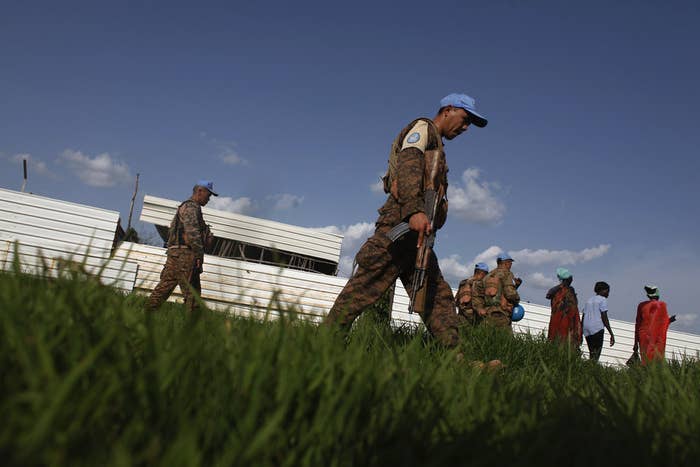
She was new to the U.N. base in Bentiu when she arrived in early 2015, but Nobert, 28, was no humanitarian naif. A Canadian with a fistful of law degrees, Nobert is an international human rights lawyer with expertise in sexual and gender-based violence. It was hardly an obvious choice for Nobert, who was born in a village of 40 people and grew up in a town of 400, borrowing Agatha Christie novels from a nice elderly neighbor because there wasn’t a library. “I’m still not very good with geography because it didn’t exist,” she said, with characteristic understated humor. “I think it serves me really well when I’m in middle of field because there aren’t street names.”
She’s spent a lot of time in the field, helping build cases against war criminals in Lebanon, in Tanzania, and at the International Criminal Court and working as a legal adviser in Gaza and Amman. Last year, she moved to South Sudan to work for a small nonprofit organization called Nonviolent Peaceforce. She spent four months in the central part of the country before moving north to Bentiu, the capital of oil-rich, conflict-wrenched Unity State.
Nobert worked, like 160-odd other humanitarians, in “the Bentiu POC” — U.N. shorthand for “protection of civilians.” The POC is essentially an internally displaced persons camp, and today it’s home to over 100,000 people who’ve had to flee their homes in the last 18 months of violence.
The camp is a 10-minute drive from Bentiu town, whose control has become symbolic of who’s winning the fight between Kiir and Machar. Changes in power are brutal and bloody, and it’s not uncommon to hear gunfire or shelling from inside the POC’s protective berms.
The South Sudanese live on one side of the POC, and U.N. peacekeepers and humanitarians live on the other. There are 16 humanitarian organizations and nine U.N. agencies working in Bentiu, running schools and clinics and learning programs, building wells, flying in food. Their staff live in human shoeboxes, military-style “containers” that can house two people, if they’re not both standing up at the same time. Living quarters and work spaces are toward the front of the “humanitarian hub”; toilets and showers are in the back. Men in shorts, and sometimes in shirts, brush their teeth at public sink, but women generally don’t look quite that casual even when moving to and from the shower. On the Bentiu base, men have triple the number of toilets: There just aren’t that many female humanitarians.
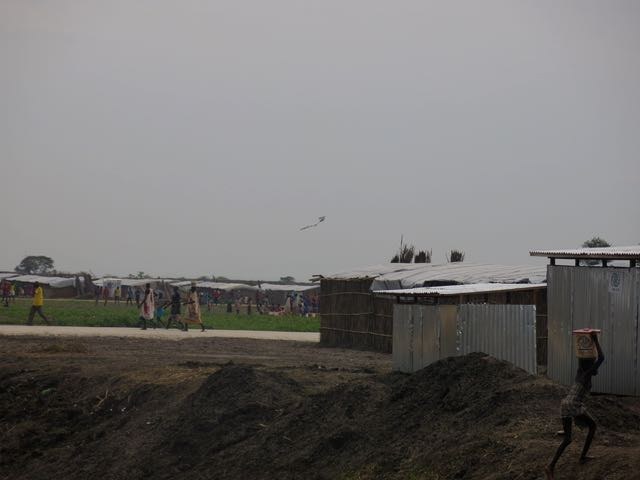
Bentiu was remote and difficult, but Nobert wasn’t intimidated; she’d been evacuated from Gaza in 2012, during the Israeli army’s operations there. And she believed deeply in bringing the under-recognized issues around gender-based violence to the forefront of humanitarian fieldwork. “Sexual violence has such an incredibly long-lasting impact on a person’s life,” Nobert said. “It’s something you live with for the rest of your life … [and] it’s such a big part of what needs to be addressed in a post-conflict country."
“I mean, obviously now it’s much more personal than it ever has been before,” she added.
Nobert knew when she woke up the morning after that something terrible had happened. “Something felt very uncomfortable with my body. I could feel physically that there had been some sort of sexual activity — which is very concerning, of course, because I don’t remember it,” she said.
To fill in those four or so hours that were missing from her memory, she did what any lawyer might: She found witnesses.
She sent a Facebook message to a colleague who’d been out with the group, asking, “What happened last night?” Nobert remembers that he responded later, saying, “What do you mean, what happened? You don’t remember?” No, she told him. And she worried. “What am I supposed to remember? What do I not know?”
He told her she’d been kissing a guy called Amed, and that she left the party with him.
“Who’s Amed?” she remembers asking.
Amed Asmail worked for Life for Construction, a small company headquartered in Khartoum, Sudan, that switched from drilling for oil to drilling for water when fighting in Bentiu began in December 2013. According to Khalil Ismail, the company’s manager, the company was subcontracted by the UNICEF to drill boreholes at the camp in Bentiu; Asmail oversaw field operations.
“The pieces started falling in place, and I didn’t want them to fall into place.”
Nobert knew of Asmail — the humanitarian hub was a small space — but they weren’t friendly. “To be honest, I thought his name was Mohammed,” she said. But as she squared her colleague’s memory of that night with her own feelings from that morning, “The pieces started falling in place, and I didn’t want them to fall into place.”
Two more undeniable things would reinforce Nobert’s discovery: a letter from Asmail apologizing for having sex with her, and a toxicology report, reviewed by BuzzFeed News, that found traces of cocaine, oxycodone, morphine, and codeine in her blood.
But neither of these documents, nor her account of what happened to her that night, would be taken up in any form of investigation.
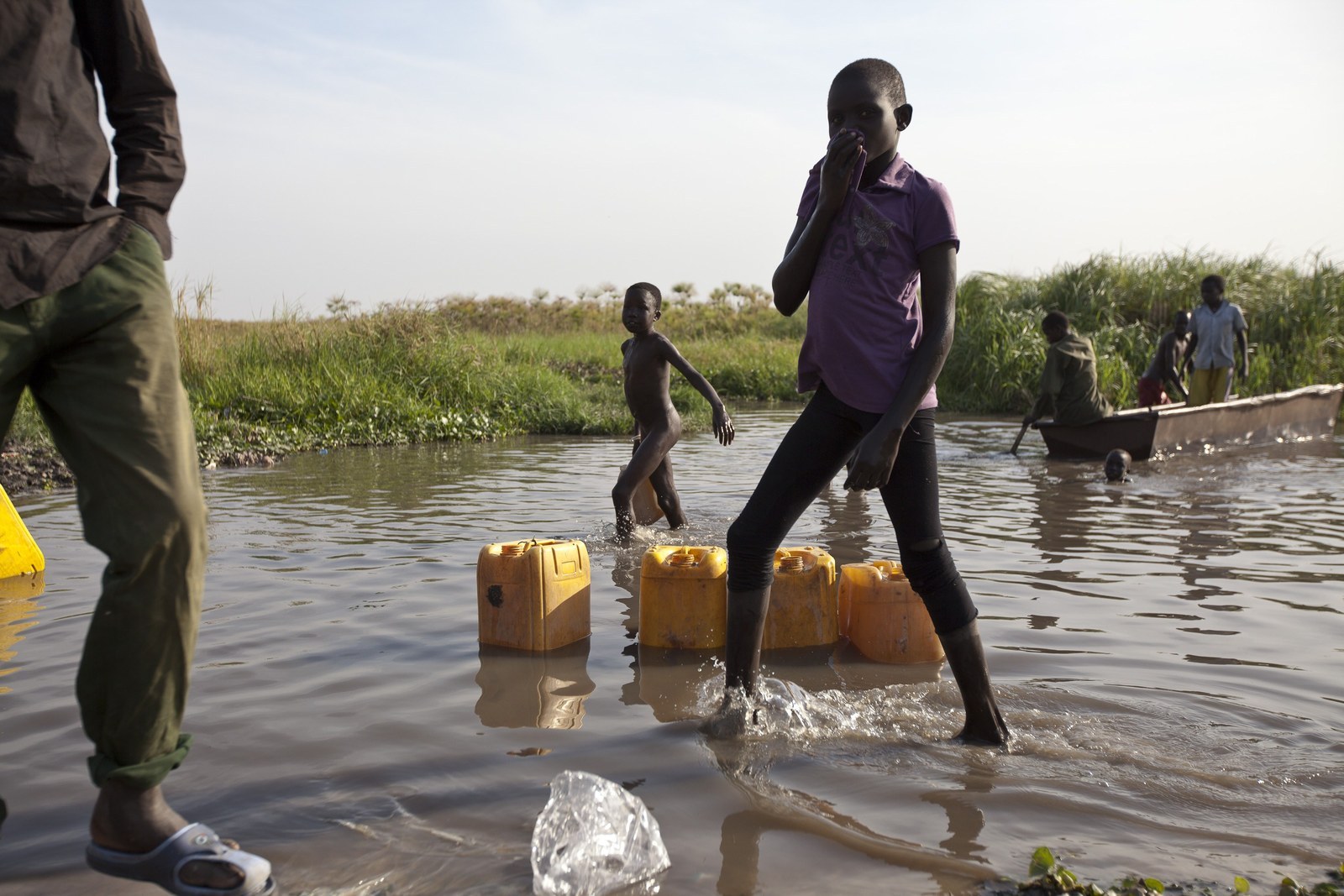
Lawyers and mental health professionals who work with sexual violence survivors know that reporting rape can be almost as traumatizing as being assaulted in the first place. In South Sudan, it could be especially bad: Nobert knew of cases where local women who reported sexual assaults to the police had been detained indefinitely, for their own “protection.” “Sexual violence is my area of expertise,” Nobert said, “and I would never recommend a woman go to the police in South Sudan.”
The humanitarian world is full of “awareness” about these things. Projects fighting gender-based violence proliferate, even in conflict zones, with billboards, murals, radio dramas, and comic books, crafted to unseat the idea that sex without consent is OK, or that women are to blame when they are raped. The U.N. works on this very issue in South Sudan, including supporting trainings for the national police and judges to improve sexual and gender-based violence response and investigations.
But none of the humanitarian world’s awareness-raising made it any easier for Nobert to seek medical help, or accountability, within the humanitarian community.
On Monday, two mornings after the rape, Nobert went to a camp clinic, run by a major NGO. It was the first time she said the words out loud — “I think I was raped” — and she cried. She asked for testing for sexually transmitted infections (STIs) and for a postexposure prophylaxis (PEP), a nastily powerful course of drugs that can prevent HIV if taken early enough. She also asked for a swab and a medical exam — standard medical procedures in rape cases. The doctor “kind of looked at me for a while, and he goes, ‘I’m going to take your blood pressure,'” she said. (Later, he brought in a female colleague Nobert remembers being “really phenomenal and incredibly comforting.”)
A nurse she knew in Bentiu recommended that she take a urine sample. It was a weak sample — taken two days after the drugging and kept in her air-conditioned container, not a fridge — but the results were inarguable. The tests found four drugs in her system, in an odd combination and at levels that suggest she may have been given overdose quantities.
But the drugs made one of the hardest part of that evening also the simplest: “I wasn’t capable of consenting,” Nobert said.
(So far, there’s been no investigation of how these drugs may have gotten into the Bentiu base. Road travel to the remote region is limited and dangerous; several humanitarians with experience working on the base told BuzzFeed News that staff for the U.N. flight rarely inspects passengers’ baggage.)
The lab report was scientific — objective, wholly dispassionate. But Nobert also had another piece of evidence: a letter from Asmail asking for her forgiveness and begging her not to tell anyone.
Asmail confirmed to BuzzFeed News by email that he wrote that letter, and that he had had sex with Nobert. He is Syrian, and his English is poor. In a long email, he recounted his version of what happened that night. In his telling, Nobert came on to him, and he “couldn’t refuse.” Asmail wrote that he and Nobert had sex in Asmail’s tent, not in Nobert’s container, and that after they slept together, she went back to the party, and he stayed in his tent and slept. He denies drugging her, alleging that it is possible to fake a toxicology report, and he denies raping her.
“How can some one … rape some one and there [is] no thing in her body [to] show that?” he wrote.
Nobert is telling her story publicly in part to fight misconceptions like that one. “It’s one of those delightful rape myths, that unless you are bruised and in a little ball crying and bleeding and completely torn up inside, that you weren’t raped,” Nobert said. “That statement follows exactly those myths — that if you’re not physically hurt, on some level you must have been consenting.”
Nobert reported the drugging and the assault to her employer, which in turn reported it to the U.N.’s field security service. Nobert also wrote an email to UNICEF. Nobert says UNICEF responded with warm concern — until they found out who the alleged rapist was.
“[When] they realized he worked for one of their vendors and not for them, then the line of communication —” Nobert took a long pause. “Obviously, I am more emotional about this than someone looking [from] outside, but … I felt quite shut out.”
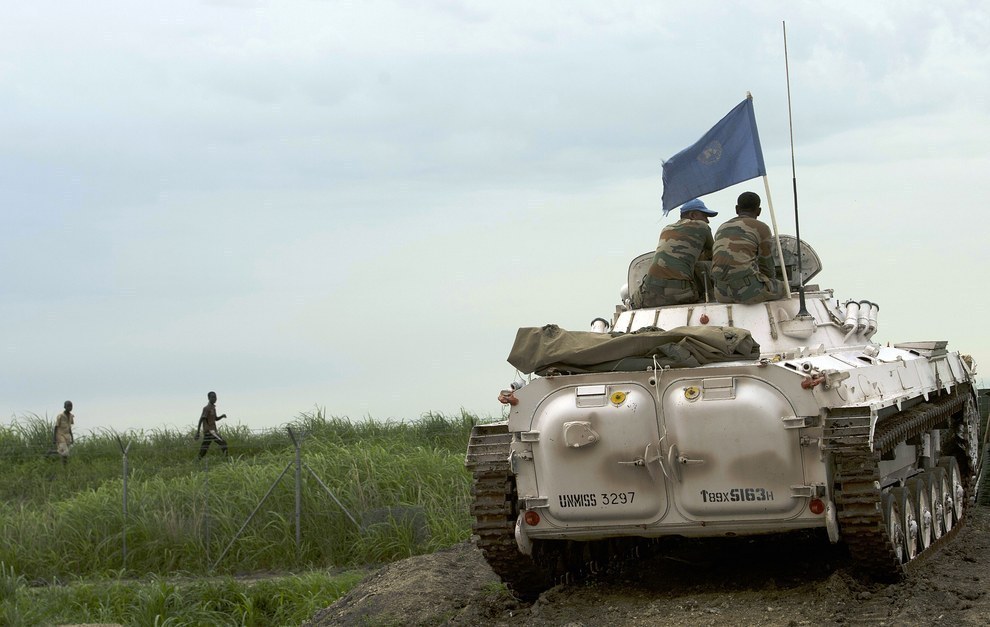
By late March, Nobert reached out to the U.N.’s Office of Internal Oversight Services (OIOS), a quasi-independent body that collects complaints of wrongdoing by U.N. personnel. Nobert explained her situation to OIOS in an email: “This UN agency has denied legal responsibility, passed this responsibility to the vendor and then, at this time, not provided information to file a complaint through the vendor. As such, I’ve been barred from filing a formal complaint.”
OIOS responded by kicking the complaint back to UNICEF, saying it had no jurisdiction over U.N. agencies.
This is where the thankless, byzantine journey of looking for justice inside the U.N. gets complicated.
Essentially, the U.N.’s fieldwork is divided into two parts: offices overseen by the secretary-general, from his secretariat, and “programs, funds and agencies.” The secretariat runs peacekeeping, field security, and coordinates humanitarian assistance, among other things. The other side is the U.N. most people know: UNICEF, the World Food Program, the World Health Organization, the U.N. Development Program, and the like.
OIOS told Nobert that it only has the authority to keep an eye on the secretariat. But UNICEF and WFP and other programs, funds, and agencies aren’t accountable to anyone but themselves. Each has its own internal investigative body, and none is required to recognize any outside oversight body. In fact, a 2003 General Assembly ruling expressly “reaffirms” their right to reject OIOS oversight.
Nobert didn’t work for the U.N., but all of the work she did was supported, in a sense, by the secretariat: She lived on a U.N. peacekeeping base, overseen by U.N. field security, and did humanitarian work coordinated by the secretariat’s humanitarian agency.
None of that mattered when she reported her rape to OIOS, because she wasn’t lodging a sexual assault complaint against the applicable kind of alleged perpetrator.
But if the boreholes drilled in Bentiu had been paid for by the U.N. peacekeeping mission directly, Nobert’s complaint would have been handled differently: A Conduct and Discipline Unit would have opened a case. That case would have been referred to OIOS, which actually would have investigated — OIOS does have jurisdiction over uniformed and civilian peacekeepers and their vendors — and, if there were grounds, the employee would have been fired. The contractor could even have been barred from future work for the U.N.
“If you’re asking, where is the oversight, the answer is — there is none”
“The U.N. is notoriously bad on accountability internally, unfortunately,” said Ron Slye, a professor of law at Seattle University School of Law and an expert in transitional justice. “Part of that comes down to what sort of political will there is to stop [sexual] abuse. If a United Nations contracted employee engaged in a crime against humanity or in genocide, nobody would sit back and say, ‘That’s too bad. We just have to wait and see if the state is going to prosecute, or if somebody else is going to come along’” and investigate.
When asked how the U.N. provides oversight and accountability for agencies and programs, Farhan Haq, a spokesperson for the secretary-general, simply referred BuzzFeed News to the 2003 rule “reaffirming” the narrow mandate of OIOS.
But there’s nothing stopping an agency from asking OIOS to investigate a report, and there’s nothing stopping OIOS from agreeing. There’s also nothing stopping an agency from conducting its own investigation, including of contractors or vendors; each agency’s publicly available investigation guidelines set out its standards and practices for doing just that. And Nobert’s allegation, supported by Asmail’s letter and a toxicology report — a lot more documentary evidence than sexual survivors commonly have — would be a clear violation of the U.N. Supplier Code of Conduct, if it were found credible.
UNICEF declined to explain why it chose not to ask OIOS for an investigation, or to conduct an investigation itself. “As no UNICEF employee was involved in this alleged incident, there are limits to what UNICEF itself can do in response in this particular case,” UNICEF wrote in an email. It declined to explain what those limits are.
“If you’re asking, where is the oversight, the answer is — there is none,” Peter Gallo, a former OIOS investigator, told BuzzFeed News.
Gallo points out that his former employer is not necessarily a model of best practices investigating sex crimes, anyway. OIOS is itself under review, by a recently appointed independent panel, for alleged mishandling of a report about French peacekeepers’ sexual exploitation and abuse of children.
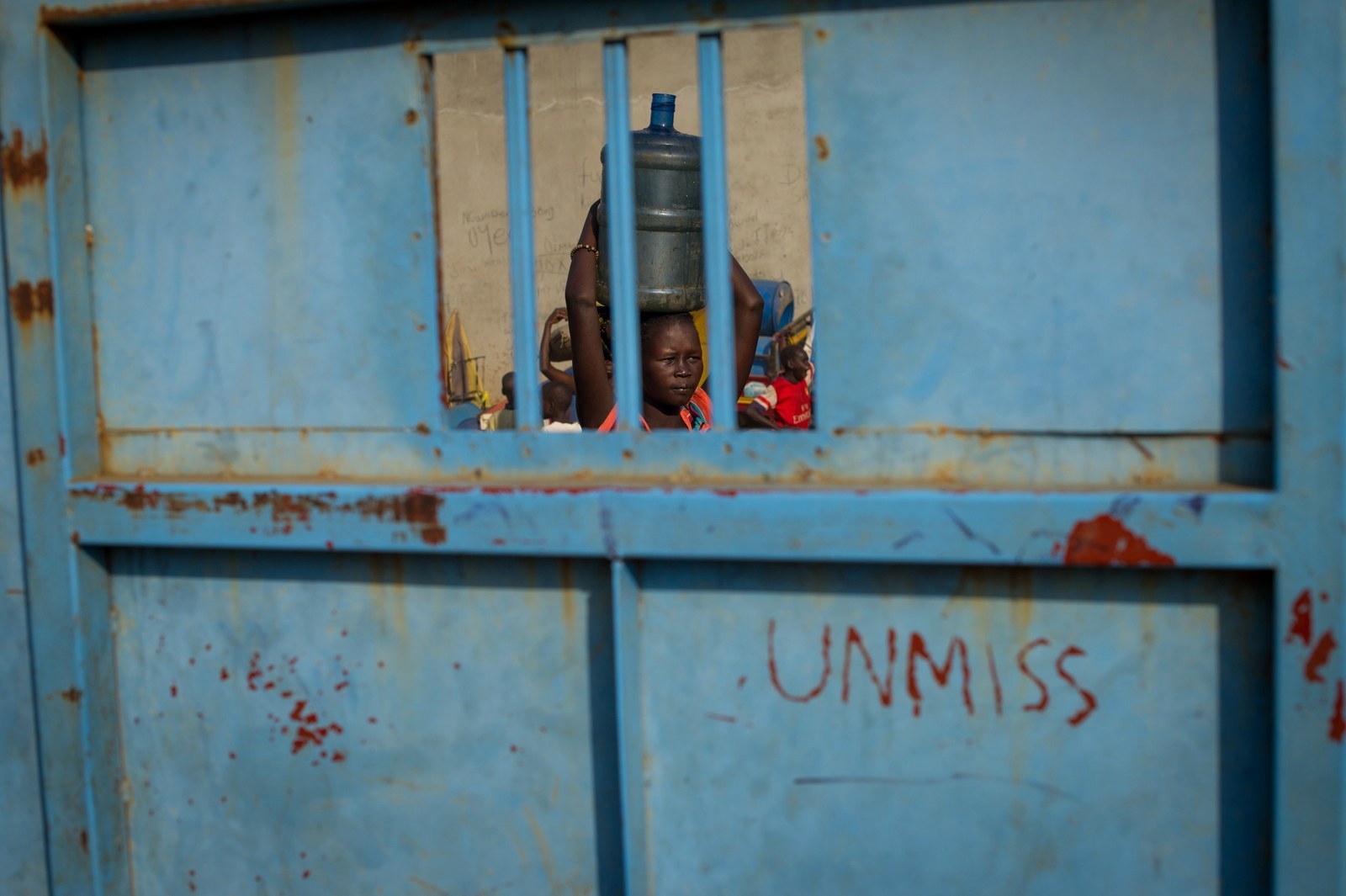
Here’s what UNICEF did do: Eventually, it gave Nobert an email address for her alleged assailant’s employer. It also recommended she report the incident to the South Sudanese police — the very police force whose poor handling of sexual violence the U.N. is trying to improve with gender-based violence support programs.
“We do believe that we took the appropriate actions under the circumstances,” UNICEF said in an email.
Meanwhile, the agency leaned on the vendor. Ismail, the manager of Life for Construction, said that UNICEF threatened not to renew its contract with the company if Asmail stayed on, but it did not specify why. Ismail said UNICEF simply told him: “If he work[s] in your company, we cannot work with your company.”
Najwa Mekki, officer in charge of UNICEF's media section, provided BuzzFeed News with a statement by email: “Given the serious nature of Ms. Nobert’s allegations, we did instruct the contractor to remove the individual concerned from all projects involving UNICEF. However, as the allegations had not yet been investigated by law enforcement agencies and were of a very sensitive nature, we did not share the specific details of her allegations with the company.”
Its unwillingness to share those specifics made Ismail nervous. He told BuzzFeed News his company was afraid Asmail might file a wrongful termination suit against him if they fired him. Because the U.N. handled the matter only by telephone, Ismail said, the company had no written documentation with which to initiate legitimate termination proceedings.
Asmail told BuzzFeed News in an email that he did consult a lawyer, but that the lawyer advised him that he had little legal recourse without anything in writing from the U.N. requesting his removal.
The U.N.’s 2015 statistics on sexual exploitation and abuse do not include a single complaint against a vendor anywhere in the world.
Ismail told BuzzFeed News that his company paid Asmail’s base salary through the end of his contract, which concludes this month. He was not, technically, fired. The allegation against him was never investigated.
Ironically, Asmail and Nobert wanted the same thing, the very thing the U.N. declined to do: They both wanted an investigation.
Asmail believes he was wrongfully treated and that he should have been given a chance to answer the accusations. He wrote in an email to BuzzFeed News that he believes the U.N. sided with Nobert because she is Canadian, and that the U.N. deliberately chose “to hear from one side [but] don’t want to hear from the other side.”
Nobert, too, believes Asmail should have had the chance to formally defend himself. “The reason there are processes in place are so that both parties get the chance to speak,” she said. “He still deserves the opportunity to put his version of the story on record. At the end of the day they treated him as guilty without having any proof, and while I have proof … there should’ve been some sort of process. I should’ve been allowed to tell them what happened; he should’ve been allowed to tell them what happened.”
Instead, Asmail disappeared from South Sudan, and Nobert’s case disappeared from the record. The U.N.’s 2015 statistics on sexual exploitation and abuse, which its website states are current through the end of May, do not include a single complaint against a vendor anywhere in the world.
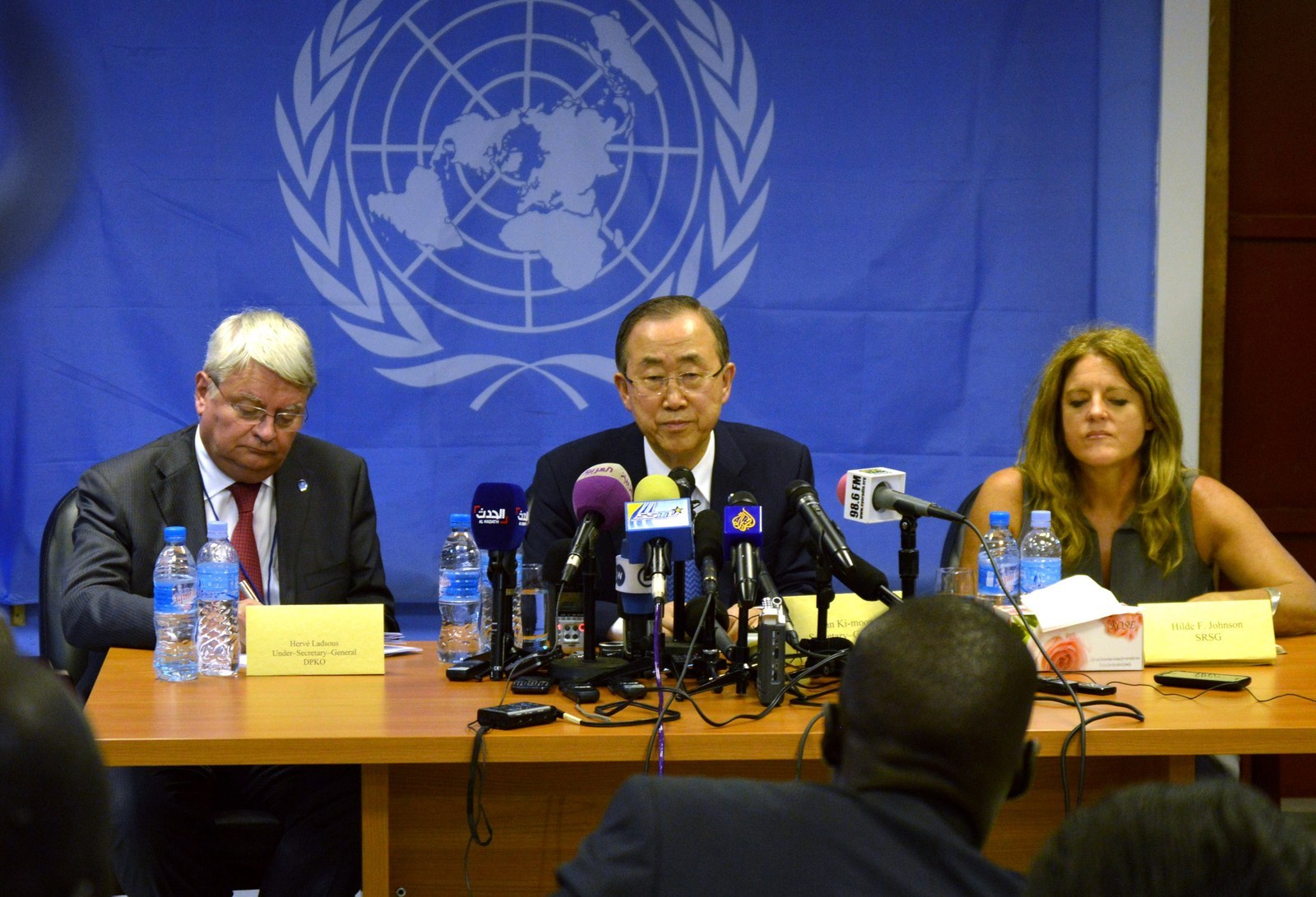
Not that there is detailed data on the rape of humanitarians to begin with. In fact, there’s almost no information, anywhere, that paints a clear picture of the scale or risk of sexual assault for humanitarian workers.
Most of the research about sexual violence in conflict zones focuses on local women and the risks they face from armed groups or from U.N. peacekeepers. “There’s a sense in which that’s as it should be,” said Amelia Hoover Green, an expert on sexual violence in conflict zones and an assistant professor of politics at Drexel University. “I would suspect that in general, aid workers are at significantly less risk than the folks they are aiding, for any number of reasons.”
It’s equally clear that there are risks to aid workers, but the those risks aren’t quantified.
Researchers of sexual violence and psychologists and psychiatrists who assist humanitarian workers think sexual violence committed against aid workers is underreported. “It’s so personal, and there are so many culturally specific factors,” said Alicia Jones, chief operating officer of the Headington Institute, a Pasadena, California–based organization that offers psychological support to humanitarians. “I don’t think we have a good grasp on how prevalent this is, and who’s most at risk. That kind of data just isn’t available.”
What little data is available, Jones said, hardly captures the problem. A USAID-supported Aid Worker Security Database records only 23 incidents of sexual assault, globally, in 10 years. In a 2011 report on gender and insecurity in aid work, one of few such reports on that issue, there’s not even a mention of sexual violence as a risk factor.
“We considered sexual assault” when writing the report but couldn’t include it, said Christina Wille, co-author of the report and manager of Insecurity Insight, which collects data on violence, because “we have basically have no information about it. It seems that women don't feel comfortable reporting sexual assault using the normal reporting mechanisms for security incidents.”
The U.N. has insisted that sexual exploitation and abuse by its affiliates has been decreasing — from 96 recorded cases in the U.N. system in 2013 to 79 last year, according to the secretary-general’s annual report on the matter. Experts on sexual violence know the crime is often underreported, and the best estimates of a problem take that into account. A draft U.N. report, leaked last month to Reuters, acknowledged that the low number is due in part to underreporting. That report focused on the scope of transactional sex, which does not carry the same weight and stigma as rape, and found the practice to be “quite common but underreported” in peacekeeping missions.
But a U.N. official familiar with conduct and discipline issues told BuzzFeed News that underreporting of sexual assault isn’t actually a problem.
“I feel that there’s a lesser degree of underreporting … here in our context,” said the official, who only agreed to be interviewed on the subject of disciplinary claims, including in cases of sexual assault, if provided anonymity. “We’re talking about abuses that take place between people who don’t necessarily know each other in the first place, which will limit the impediment to reporting.”
The official attributed underreporting to “fear of retribution or consequences to one’s career, to one’s family relations, to one’s friendship relations, and so forth” — fears he suggested are absent when the victim doesn’t know the assailant.
“That doesn’t mean that it removes all impediments to reporting, including shame that victims may feel,” he added.
The official also said the secretariat’s discipline channels “very seldom” see reports of sexual assault in which both the victim and perpetrator are humanitarian workers. “Off the top of my head, maybe a couple of cases a year,” he said.
But it’s much more likely, experts say, that these cases happen and aren’t being recorded. In fact, after Nobert came forward with her case in South Sudan, other cases surfaced, including at least two in which drugs were used, according to several sources with experience working in South Sudan. But the topic is so sensitive, few organizations will discuss these matters.
“I understand it’s hard to be the first. I don’t blame anybody for not wanting to talk about this. You feel incredibly exposed,” Nobert said — in her case, to an agency she felt “didn’t really want to have to deal with hits … [and] thought that by just getting him out of there, it was solving the problem.”
Today, Nobert is home in Canada, recuperating, baking peach pies, and thinking about her next steps. She hopes to finish her Ph.D., ongoing at Tilburg University in the Netherlands, next year. Right now, though, she’s focusing on advocacy: Nobert told her story to BuzzFeed News because she wants the humanitarian world — the U.N. and all its offices and agencies, and the many non-U.N. international aid groups — to finally start talking, seriously and openly, about sexual assault in the field.
Telling her story, Nobert knows, is going to change her life. Every time she walks into an interview, she will carry more than her résumé, her expertise, her law degrees. She’ll also be a sexual violence survivor, one of the few to go public about a problem humanitarian agencies still find hard to discuss.
Changing systems is challenging; changing minds about the pervasive myths of rape is, perhaps, even harder. But Nobert wants to — needs to — try.
“Her willingness to come forward did create space for constructive conversations [about sexual assault],” said Tiffany Easthom, the country director of Nonviolent Peaceforce. She said that also included inside that organization — it has since improved its policies on sexual assault response, Easthom said, including making sure that the HIV-fighting postexposure prophylaxis is available even in the most remote locations.
Some U.N. staff in South Sudan reportedly tried to improve response to sexual assault reporting, though efforts have stalled. Other humanitarian workers in Juba told BuzzFeed News that Nobert’s willingness to make this case the focus of country director meetings and security briefings have inspired other institutions to review their policies and support procedures.
But there are limits, she knows, to advocacy. Changing systems is challenging; changing minds about the pervasive myths of rape is, perhaps, even harder. But Nobert wants to — needs to — try. And she’s tenacious. Easthom, who’s worked with Nobert, calls her a “warrior princess.”
Even if she accomplishes those two things, what happened to her will never change: She will always have been drugged, and she will always have been raped, and she will never know everything about what happened that night. Sometimes she’s relieved that the drugs robbed her of remembering every detail; sometimes, she wishes she did.
“The sexual assault will always be with me for the rest of my life. It’s a part of me now,” she said. “And I guess the love-hate relationship with the hours of utter blackness that night will always be with me too.”
It would have been easier to put all that behind her if she’d kept quiet. But that, Nobert said, was the only thing she couldn’t do.
“If I hadn’t said anything, I could have gone on my merry way. … But if I knew it happened to somebody else, I could never forgive myself. That’s just the way my mind operates,” she said.
“If I can do anything to stop that, I have to.”
Nobert originally agreed to talk with BuzzFeed News on the record on the condition that the UN agency was not named. Stephane Dujarric, the UN Secretary General's spokesman, later confirmed in a press briefing that the agency in question is UNICEF. The story has been updated.

